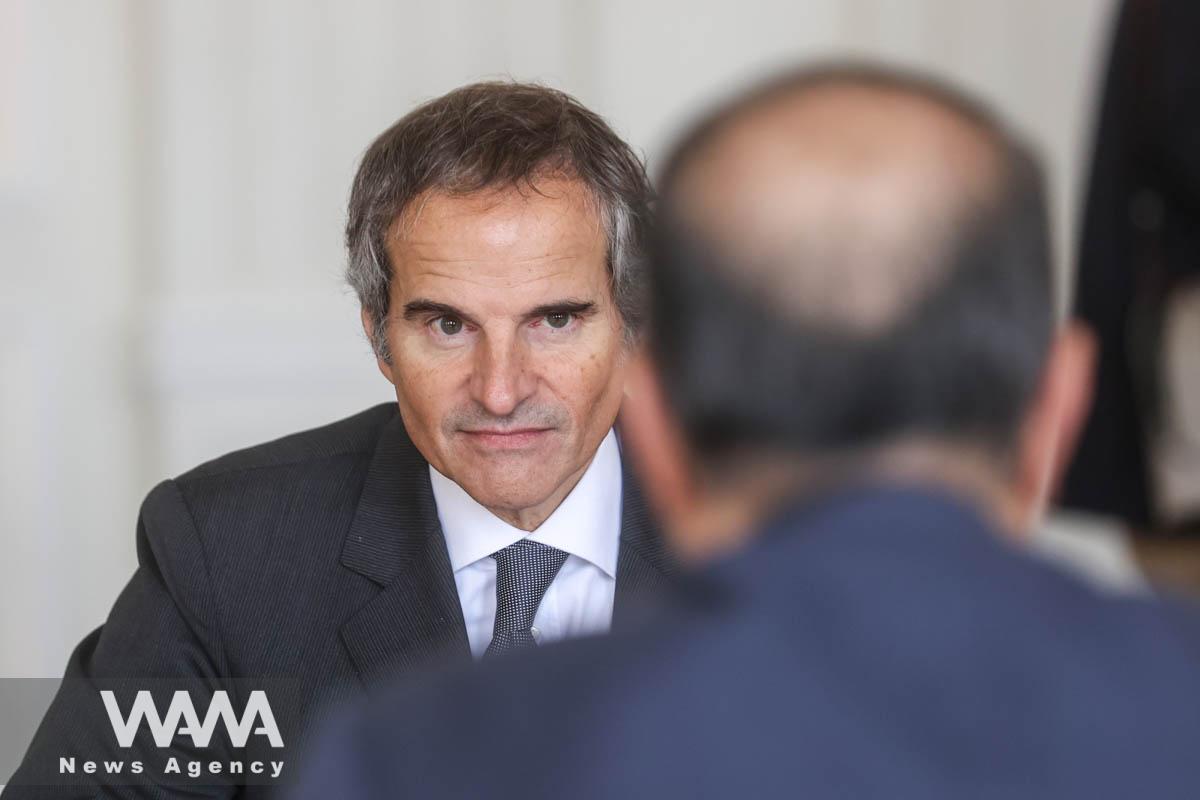Will the Knot in Iran and the IAEA’s Relations be Untied?
WANA (Nov 14) – Amid a period of considerable ups and downs in the past six months between Iran and the International Atomic Energy Agency (IAEA), Rafael Grossi’s trip to Tehran, as the director general of the IAEA, carries substantial significance. This visit has the potential not only to impact bilateral relations but also to steer the future of Iran-IAEA relations in a new direction.
However, three key factors make this visit exceptionally delicate. Neglecting these factors could render Grossi’s visit not only ineffective but could lead to further complications down the road.
After months of Grossi expressing interest in visiting Iran, he has finally arrived in Tehran to engage in discussions with high-ranking Iranian officials. The IAEA has issued a statement framing this trip as part of the March 2023 agreements, with Grossi underscoring its importance by stating, “It is crucial to make substantial progress in implementing the joint statement agreed with Iran.”
Kazem Gharibabadi, Iran’s Deputy Foreign Minister for Legal and International Affairs, announced that Grossi’s two-day visit will include meetings with the President, Foreign Minister, and the head of the Atomic Energy Organization of Iran. Gharibabadi emphasized that Iran remains committed to cooperating with the IAEA under its safeguards obligations but stated that “if certain countries seek to disrupt these relations with political motivations, Iran will not retreat from its position.”
Recent developments indicate that tensions between Iran and the IAEA persist. At the IAEA’s recent Board of Governors meeting, the United States and three European nations (the UK, France, and Germany) issued a joint statement accusing Iran of non-cooperation with the IAEA and claimed that Tehran had failed to provide credible technical explanations regarding undeclared nuclear activities in areas like Turquzabad and Varamin. These allegations, previously raised by Grossi and some Western officials, have sparked sharp responses from Iranian authorities.

Important Talks Between Araqchi and Grossi on Iran’s Nuclear Program
WANA (Nov 14) – This morning, Abbas Araqchi, Iran’s Deputy Foreign Minister, and Rafael Grossi, Director General of the International Atomic Energy Agency (IAEA), held significant discussions regarding Iran’s nuclear program. Baghaei, spokesperson for Iran’s Foreign Ministry, announced the news, stating: “These discussions are part of Iran’s ongoing cooperation with the IAEA to clear […]
Three Major Challenges in Grossi’s Trip to Tehran
1. A New Chapter or Reiteration of Old Positions?
Over the years, relations between Iran and the IAEA have been fraught with tension, largely due to the political approach of the Agency and pressures from Western countries. Now presents a viable opportunity for a fresh chapter in these relations, but this will require mutual flexibility and commitment.
Iran, in March 2023, adhered to its commitments to increase the IAEA’s inspection oversight, demonstrating a genuine intention for cooperation. However, if the Agency persists in repeating past approaches, hopes for improved relations could fade.
2. Iran’s Peaceful Stance Amid Regional Challenges
Despite religious edicts and Supreme Leader Ayatollah Khamenei’s firm stance against the production and use of nuclear weapons, recent regional developments, especially Israel’s aggression, have led some experts to suggest that Iran may need to revisit its nuclear policy.
Israel has recently increased its threats against Iran’s nuclear facilities through Western media and has continued its belligerence against neighboring countries. Nevertheless, Iran remains committed to defending the peaceful nature of its nuclear program and expects the IAEA to reflect this reality in its reports to the international community.

Revisiting the Nuclear Fatwa of Iran’s Supreme Leader: Change or Adaptation?
WANA (Nov 09) – The issue of nuclear weapons and the stance of the Islamic Republic of Iran on this subject remains one of the most contentious topics in international politics. A key element of Iran’s policy is rooted in a fatwa (religious decree) by Supreme Leader Ayatollah Khamenei, which prohibits the use and development […]
3.Trump’s Return and the Future of Nuclear Agreements
Donald Trump, whose withdrawal from the JCPOA (Joint Comprehensive Plan of Action) and imposition of severe sanctions against Iran remain vivid in memory, has once again assumed the U.S. presidency. This development has raised concerns about the future of international agreements with Iran.
Rafael Grossi’s presence in Tehran could signal to the IAEA and the international community that Iran is committed to continuing dialogue and negotiations. However, if this message is not approached with realism and an understanding of the current regional sensitivities, a significant opportunity may be lost.
Iran’s Demand from the IAEA: Transparency and Impartiality
Iran is seeking for the IAEA to distance itself from political influences in its interactions and operate based on technical and legal principles. The nuclear file should not be influenced by Israeli claims but should return to a legal and rational course. Through bilateral cooperation and transparent reporting, the groundwork for international trust-building can be laid.
It appears Grossi faces a serious test during this visit; a report that clearly confirms the peaceful nature of Iran’s nuclear activities could serve as a key factor in reducing regional tensions. Otherwise, this visit may be remembered as a missed opportunity in the future.













